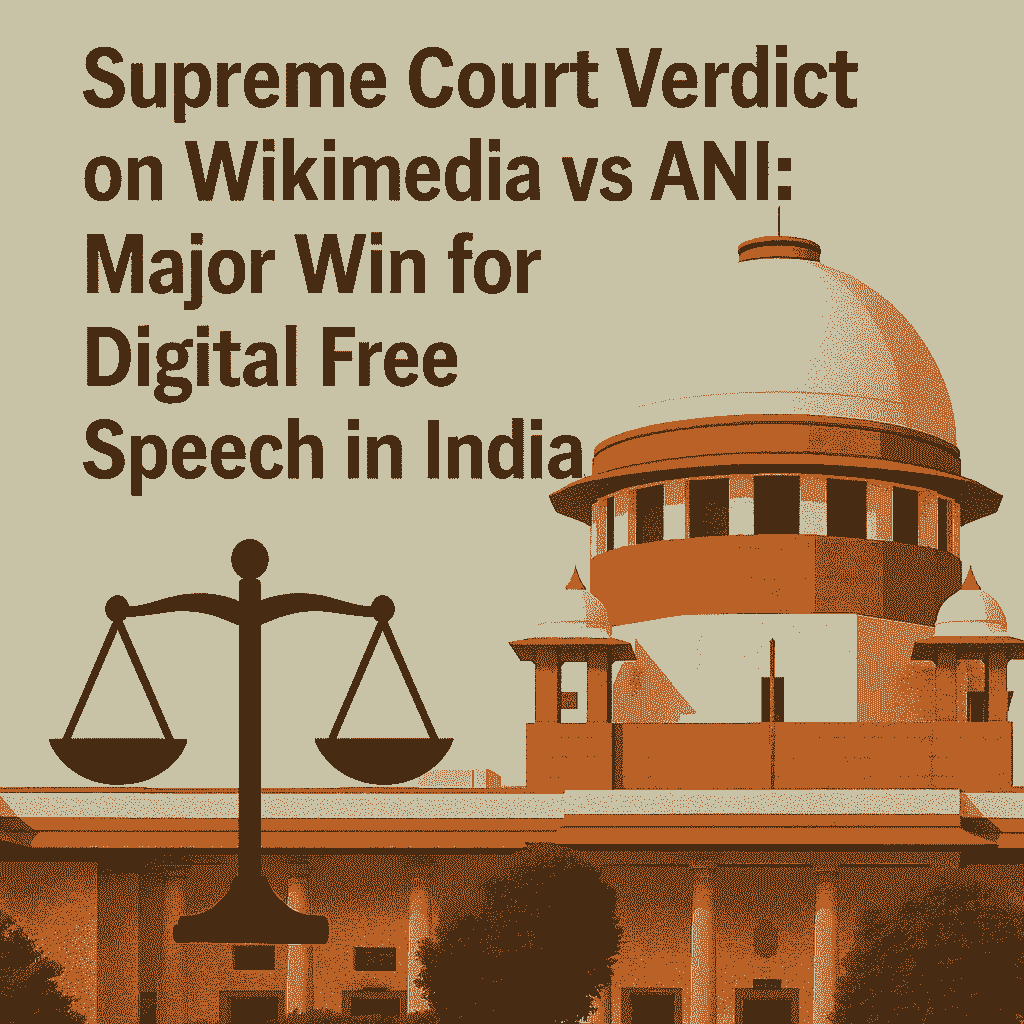In a significant Wikimedia vs ANI Supreme Court judgment delivered on 9th May 2025, the Supreme Court of India set aside a Delhi High Court order that had directed the Wikimedia Foundation, which operates Wikipedia, to take down content related to Indian news agency ANI Media Pvt. Ltd. The Apex Court’s ruling is being hailed as a landmark decision on the constitutional right to freedom of speech and expression, especially in the context of online platforms and intermediary liability.
Wikimedia vs ANI Supreme Court judgment explained
🏛️ Case Title: Wikimedia Foundation Inc. vs. ANI Media Pvt. Ltd.
📅 Judgment Date: 9th May 2025
📚 Area of Law: Constitutional Law, Defamation, Digital Rights, Freedom of Speech

This article explains the background of the case, the legal issue involved, the Court’s reasoning, and what this judgment means for freedom of digital expression in India.
📖 Background of the Case
- ANI Media Pvt. Ltd. filed a lawsuit alleging that a Wikipedia article contained defamatory content regarding a legal dispute in which ANI was involved.
- ANI claimed that the content published on Wikipedia damaged its reputation and therefore sought removal of the entire article.
- The Delhi High Court granted interim relief and directed Wikimedia Foundation to remove the content, triggering concerns about online censorship and freedom of expression.
- Wikimedia challenged the order before the Supreme Court.
⚖️ Legal Issue
The central issue before the Supreme Court was:
“Whether a judicial order directing removal of Wikipedia content without first examining its veracity and public interest implications violates the fundamental right to freedom of speech under Article 19(1)(a) of the Constitution?”
🧠 Supreme Court’s Reasoning
The bench, led by Justice Sanjiv Khanna, made the following critical observations:
- Wikipedia is an open-source platform where anyone can contribute. It is not a traditional publisher but an intermediary under the Information Technology Act, 2000.
- The content in question was based on public records and verifiable sources. The Court emphasized that truth and public interest are valid defences against defamation.
- The Delhi High Court’s blanket takedown order violated the principle of proportionality—a fundamental standard in Article 19(2) restrictions.
- The Supreme Court noted that judicial institutions and media agencies must be open to fair criticism and scrutiny, especially in a democratic society.
📌 Final Decision:
The Supreme Court set aside the Delhi High Court’s interim order and dismissed ANI’s request to take down the Wikipedia article.
📌 Key Takeaways from the Supreme Court’s Interpretation
- Freedom of Expression Online Strengthened: This judgment affirms that online platforms like Wikipedia cannot be compelled to remove content without proper legal justification.
- Intermediary Protections Upheld: Wikimedia, being an intermediary, enjoys protection under the IT Act, unless it knowingly hosts illegal content.
- Judicial Oversight Must Be Proportional: Courts must evaluate whether the restriction on speech is proportionate and necessary in a democratic society.
- Encourages Transparency in Journalism & Public Record Sharing.
🧩 Relevance for Law Students and Legal Researchers
This case offers insights into:
- Constitutional Law – Article 19(1)(a) and permissible restrictions under Article 19(2).
- Defamation Law – Civil remedies, reputation, and defenses.
- Information Technology Law – Roles and liabilities of intermediaries like Wikipedia.
- Public Interest Doctrine – Importance of open access to information.
🧑⚖️ Citation of Legal Provisions & Case Laws
- IT Act Reference:
Under Section 79 of the Information Technology Act, 2000, intermediaries like Wikimedia enjoy safe harbour protection—they are not liable for third-party content unless they fail to act on lawful takedown requests. - Supporting Case Law:
Cite Shreya Singhal vs. Union of India (2015), where the Supreme Court held that intermediaries are only obliged to remove content upon court orders or government notifications.
Read More: Supreme Court Judgment on Illegal Arrest – Vihaan Kumar v. State of Haryana (2025)
🌐 Global Relevance
- The judgment aligns Indian jurisprudence with international standards on online speech, such as:
- Article 19 of the ICCPR (International Covenant on Civil and Political Rights).
- European Court of Human Rights (ECHR) rulings on freedom of expression vs reputation rights.
- Article 19 of the ICCPR (International Covenant on Civil and Political Rights).
📌 Practical Implications
- For Law Practitioners: It reinforces that civil defamation claims must be tested for proportionality before gag orders are issued.
- For Tech Platforms: Encourages development of transparent content moderation policies and reliance on court orders, not just private demands.
- For Journalists & Public: Protects use of publicly available and sourced content in reporting, criticism, or commentary.
📊 Data Angle (For Authority)
- Over 6 million Indian users access Wikipedia monthly.
The ruling ensures that educational platforms remain free of arbitrary censorship, impacting the public’s Right to Know under Article 19(1)(a).
💬 Quotes from the Judgment (Optional Enhancement)
“A democratic society must allow criticism, fair or otherwise, of public institutions and actors… Suppressing facts available in the public domain merely to protect reputation is unconstitutional.”
— Justice Sanjiv Khanna, Supreme Court of India
Read More: No Need for Separate Possession Relief in Specific Performance Suits: SC judgment
💡 FAQs
Q1. What did the Supreme Court rule in Wikimedia vs ANI?
Ans: The Court ruled in favour of Wikimedia Foundation and overturned the Delhi High Court’s takedown order, citing the right to freedom of speech.
Q2. Is Wikipedia liable for defamation under Indian law?
Ans: As an intermediary, Wikipedia is not directly liable unless it knowingly hosts or refuses to remove defamatory content after notice.
Q3. Does this judgment affect other online platforms like YouTube or X (Twitter)?
Ans: Yes, it sets a precedent for platforms to resist disproportionate censorship and promotes free speech online.
🧠 Author’s Note
This judgment reaffirms that Indian courts will protect digital free speech, especially on platforms that promote public knowledge. It is a strong reminder that judicial orders must not cross into censorship unless the law is violated and public interest is harmed.
Read full judgment here
Read also:
